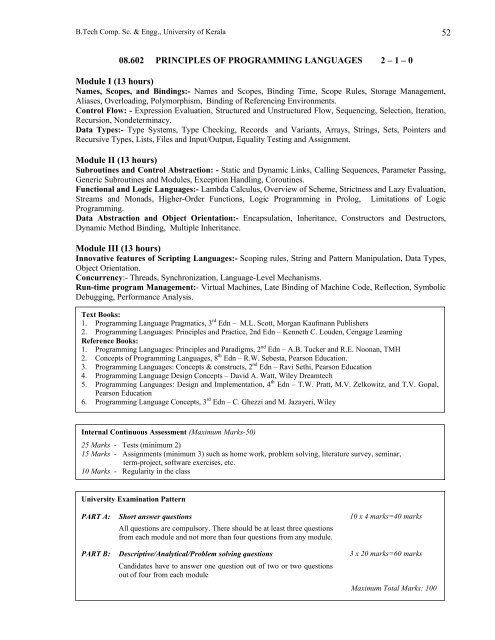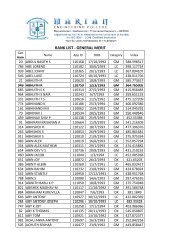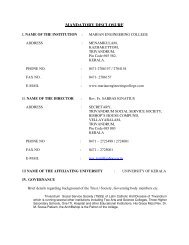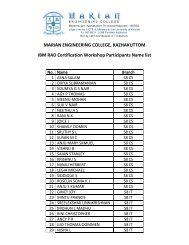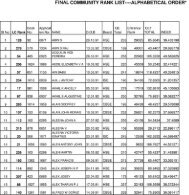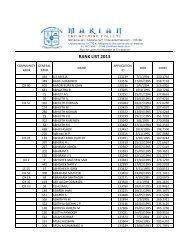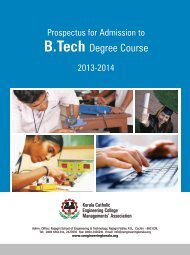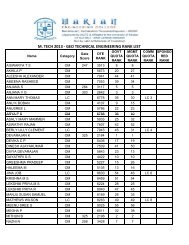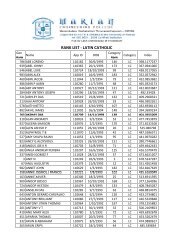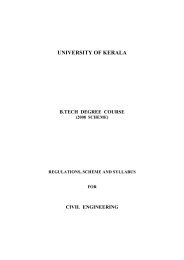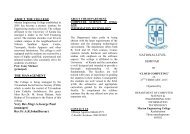UNIVERSITY OF KERALA - Marian Engineering College
UNIVERSITY OF KERALA - Marian Engineering College
UNIVERSITY OF KERALA - Marian Engineering College
Create successful ePaper yourself
Turn your PDF publications into a flip-book with our unique Google optimized e-Paper software.
B.Tech Comp. Sc. & Engg., University of Kerala 52<br />
08.602 PRINCIPLES <strong>OF</strong> PROGRAMMING LANGUAGES 2 – 1 – 0<br />
Module I (13 hours)<br />
Names, Scopes, and Bindings:- Names and Scopes, Binding Time, Scope Rules, Storage Management,<br />
Aliases, Overloading, Polymorphism, Binding of Referencing Environments.<br />
Control Flow: - Expression Evaluation, Structured and Unstructured Flow, Sequencing, Selection, Iteration,<br />
Recursion, Nondeterminacy.<br />
Data Types:- Type Systems, Type Checking, Records and Variants, Arrays, Strings, Sets, Pointers and<br />
Recursive Types, Lists, Files and Input/Output, Equality Testing and Assignment.<br />
Module II (13 hours)<br />
Subroutines and Control Abstraction: - Static and Dynamic Links, Calling Sequences, Parameter Passing,<br />
Generic Subroutines and Modules, Exception Handling, Coroutines.<br />
Functional and Logic Languages:- Lambda Calculus, Overview of Scheme, Strictness and Lazy Evaluation,<br />
Streams and Monads, Higher-Order Functions, Logic Programming in Prolog, Limitations of Logic<br />
Programming.<br />
Data Abstraction and Object Orientation:- Encapsulation, Inheritance, Constructors and Destructors,<br />
Dynamic Method Binding, Multiple Inheritance.<br />
Module III (13 hours)<br />
Innovative features of Scripting Languages:- Scoping rules, String and Pattern Manipulation, Data Types,<br />
Object Orientation.<br />
Concurrency:- Threads, Synchronization, Language-Level Mechanisms.<br />
Run-time program Management:- Virtual Machines, Late Binding of Machine Code, Reflection, Symbolic<br />
Debugging, Performance Analysis.<br />
Text Books:<br />
1. Programming Language Pragmatics, 3 rd Edn – M.L. Scott, Morgan Kaufmann Publishers<br />
2. Programming Languages: Principles and Practice, 2nd Edn – Kenneth C. Louden, Cengage Learning<br />
Reference Books:<br />
1. Programming Languages: Principles and Paradigms, 2 nd Edn – A.B. Tucker and R.E. Noonan, TMH<br />
2. Concepts of Programming Languages, 8 th Edn – R.W. Sebesta, Pearson Education.<br />
3. Programming Languages: Concepts & constructs, 2 nd Edn – Ravi Sethi, Pearson Education<br />
4. Programming Language Design Concepts – David A. Watt, Wiley Dreamtech<br />
5. Programming Languages: Design and Implementation, 4 th Edn – T.W. Pratt, M.V. Zelkowitz, and T.V. Gopal,<br />
Pearson Education<br />
6. Programming Language Concepts, 3 rd Edn – C. Ghezzi and M. Jazayeri, Wiley<br />
Internal Continuous Assessment (Maximum Marks-50)<br />
25 Marks - Tests (minimum 2)<br />
15 Marks - Assignments (minimum 3) such as home work, problem solving, literature survey, seminar,<br />
term-project, software exercises, etc.<br />
10 Marks - Regularity in the class<br />
University Examination Pattern<br />
PART A: Short answer questions 10 x 4 marks=40 marks<br />
All questions are compulsory. There should be at least three questions<br />
from each module and not more than four questions from any module.<br />
PART B: Descriptive/Analytical/Problem solving questions 3 x 20 marks=60 marks<br />
Candidates have to answer one question out of two or two questions<br />
out of four from each module<br />
Maximum Total Marks: 100


